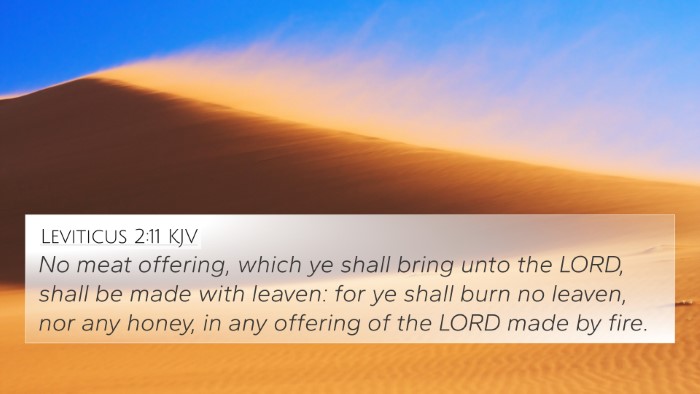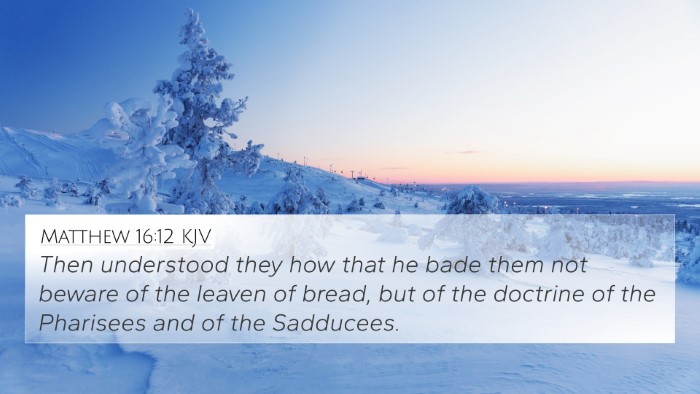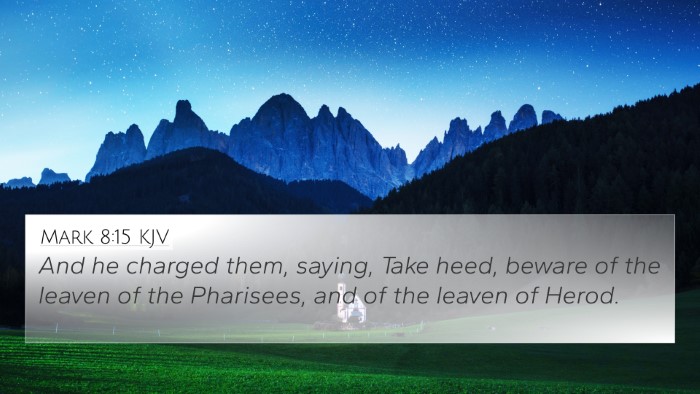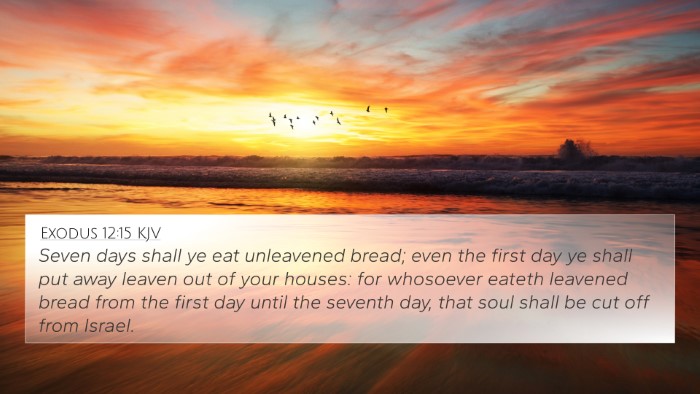Understanding Matthew 16:6
Verse: "Then Jesus said to them, 'Take heed and beware of the leaven of the Pharisees and the Sadducees.'"
Summary of Meaning
Matthew 16:6 is a warning from Jesus to His disciples to be vigilant against the teachings and influences of the religious leaders of the time, specifically the Pharisees and Sadducees. Both groups had different theological views, yet Jesus highlights that their corrupt doctrines have a pervasive, detrimental effect, likening their teachings to leaven that alters bread.
Commentary Insights
Commentators such as Matthew Henry, Albert Barnes, and Adam Clarke provide profound insights into this verse, elucidating the implications of Jesus' warning.
- Matthew Henry: Emphasizes the importance of discernment in spiritual matters. He notes that the leaven metaphor suggests that small errors can lead to significant consequences if not addressed.
- Albert Barnes: Highlights the context of this warning, explaining that the disciples were expressing concern over the lack of bread, showing their misunderstanding of Jesus' metaphor. Barnes points out that Jesus admonishes them not only for their lack of faith but also for their need to be aware of the corrupting influences around them.
- Adam Clarke: Discusses the historical context of the Pharisees and Sadducees, their differing beliefs, and how their teachings, when mixed with truth, can corrode genuine faith. Clarke suggests that Jesus' warning was not merely about literal bread, but about the teachings that can lead one away from true understanding.
Related Bible Cross References
This verse connects thematically with several other scripture passages where Jesus addresses false teachings and their consequences. Here are some notable cross-references:
- Luke 12:1: "In the meantime, when an innumerable multitude of people had gathered together, so that they trampled one another, He began to say to His disciples first of all, 'Beware of the leaven of the Pharisees, which is hypocrisy.'
- Galatians 5:9: "A little leaven leavens the whole lump." This reinforces the idea that false teachings can spread and contaminate truth.
- Matthew 23:1-4: Jesus critiques the Pharisees for their burdensome traditions and hypocrisy, which serves as a reminder of the dangers of following corrupt leaders.
- 1 Corinthians 5:6-8: Paul uses the leaven analogy in regard to moral purity in the church, instructing believers to avoid corruption.
- Mark 8:15: Similar to Matthew 16:6, Jesus warns His disciples about the leaven of the Pharisees and Herod, indicating the influence of both religious and political powers.
- 2 Timothy 4:3-4: Speaks to the time when people will not endure sound doctrine but will turn away to myths, paralleling the dangers posed by the leaven of false teaching.
- Matthew 5:20: Jesus asserts that righteousness must exceed that of the scribes and Pharisees, pointing to the necessity of true spiritual integrity.
Applications of Matthew 16:6
This verse serves as a caution for Christians today to critically evaluate teachings they encounter, whether from leaders, literature, or culture. It encourages:
- Discernment: Understanding the roots and implications of teachings before accepting them.
- Critical Reading: Utilizing tools like a Bible concordance and reference guides to study context and connections between verses.
- Community Accountability: Engaging in discussions with other believers to evaluate teachings and their fidelity to Scripture.
Conclusion
Matthew 16:6 remains a pertinent reminder for believers to stay rooted in biblical truth and to be cautious against corrupt teachings. By utilizing resources such as a Bible cross-reference guide, one can uncover connections and deepen their understanding of scriptural integrity.











